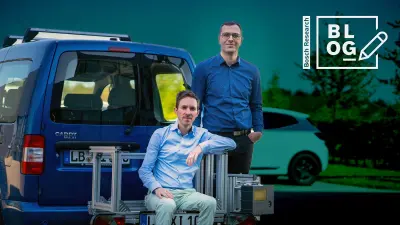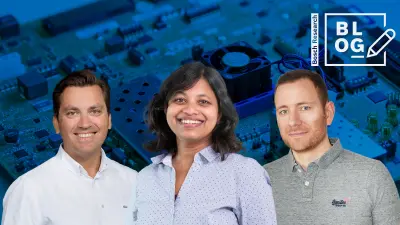Innovative Software and AI: “Invented for life”
In our modern world, software is at the heart of virtually everything we use daily. It enables us to connect, automate tasks and create powerful devices, tools and services that help us achieve great things. At Bosch Research, we tackle the challenges regarding the development of software and artificial intelligence (AI) head on, making them faster, more efficient and better than ever.

Bosch’s mission is “Invented for life” — and software and artificial intelligence have long been an integral part of this. Since 2022, Bosch products in all classes contain software or AI, whether to control an electric motor, to predict maintenance intervals for industrial equipment or to ensure quiet and comfort in your home. The rapid advance of software and artificial intelligence inspires Bosch Research to push the boundaries of what is possible all the time.
As the importance of software has grown, the way it is designed, developed and updated has been changing too over the years. Gone are the days of static embedded software that can no longer be changed once production has started. Today, software can be updated, upgraded and deployed to devices spread across various locations. Thanks to software updates, the usability and functions of devices can be improved throughout their life cycle.
Ahead of time: Adapting software and new programming languages for development

One area which Bosch Research is particularly interested in is software that adapts to the environment. In other words, software that is smart and responds to changing conditions in real time, for example changing weather patterns, unexpected workloads or even normal wear and tear. We research modern control theory approaches with online, reinforcement and federated machine learning, and make them accessible to Bosch's business units.
One area of application for adaptive software is controlling the functions of partially automated machines such as an excavator. This type of software can help to make machines more precise and extend their lifespan by allowing them to adapt to the world around them. This includes adapting to production tolerances as well as physical or mechanical changes affecting the machine itself such as wear or corrosion. Self-learning software can thus help to ensure that a machine operates accurately in the long term. In this context, we also explore how automation can help us to safeguard, verify and validate self-learning systems in an effective manner.
Another key area is automating development and certification processes for software, i.e. tools and techniques to automatically support software development, testing, certification, deployment and operation. Frequent software updates are becoming the norm. Accordingly, development cycles should require less time, money and specialists in order to bring a product to market. At Bosch Research, we are looking at ways of ensuring the security of this rapidly changing software in an automated manner. This means, for example, that the required documents for security certification can be updated automatically with every release instead of having to be manually rewritten with every change in the software.
We also carry out research into new programming and modeling languages. Today’s programming languages are often hard to use and it is easy to make mistakes. Instead, we explore user-defined, domain-specific modeling and programming languages (e.g. Blech) that make software development faster, more secure and more efficient. They will help Bosch business units save time and money when developing software while preserving Bosch's high quality and security standards.

Faster, higher, further: Innovations in software design and the crucial role of AI
The quality of programming code and the speed of its development are also key areas of our applied research. Suitable software abstractions allow for hardware-independent deployments and for code that is easier to understand and modify. At the same time, they enable developers to focus on the desired application rather than the implementation details. Furthermore, innovations in the software development process speed up implementation and development itself.
But the most exciting development in recent years is without doubt the rise of AI. It has the potential to completely change the way we give behavior and intelligence to devices, systems and services. With AI, we can train systems to perform specific tasks instead of programming them explicitly. This opens up completely new ways of developing smarter, more adaptive products more quickly – and adapting and improving them later on. Most recently, developments in this field have led to foundation models which revolutionize the way we use AI. Examples include combining domain knowledge with generic foundation models to develop querying systems for our own data. We also use these models in our software development to tackle key questions:
- How can we efficiently collect, manage and prepare high-quality data to train AI systems?
- How can we train AI systems with limited data volumes even though large amounts of data are usually required?
- How can we use AI in hardware and software development – in a reliable, secure, effective and transparent way?
- How do we create comprehensible, transparent AI systems in safety-critical areas such as the automotive sector, households and industry?
With all this, Bosch Research bridges the gap between science and practice: We present our research at top conferences and endeavor to work with universities, associations and potential business partners that share our mission to develop applications and products for life.





